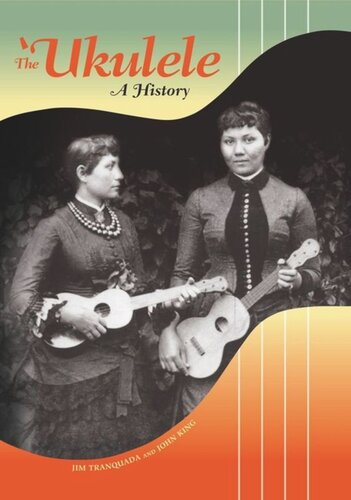

Most ebook files are in PDF format, so you can easily read them using various software such as Foxit Reader or directly on the Google Chrome browser.
Some ebook files are released by publishers in other formats such as .awz, .mobi, .epub, .fb2, etc. You may need to install specific software to read these formats on mobile/PC, such as Calibre.
Please read the tutorial at this link: https://ebookbell.com/faq
We offer FREE conversion to the popular formats you request; however, this may take some time. Therefore, right after payment, please email us, and we will try to provide the service as quickly as possible.
For some exceptional file formats or broken links (if any), please refrain from opening any disputes. Instead, email us first, and we will try to assist within a maximum of 6 hours.
EbookBell Team

4.7
16 reviewsSince its introduction to Hawai‘i in 1879, the ‘ukulele has been many things: a symbol of an island paradise; a tool of political protest; an instrument central to a rich musical culture; a musical joke; a highly sought-after collectible; a cheap airport souvenir; a lucrative industry; and the product of a remarkable synthesis of western and Pacific cultures. The ‘Ukulele: A History explores all of these facets, placing the instrument for the first time in a broad historical, cultural, and musical context.
Drawing on a wealth of previously untapped sources, Jim Tranquada and John King tell the surprising story of how an obscure four-string folk guitar from Portugal became the national instrument of Hawai’i, of its subsequent rise and fall from international cultural phenomenon to “the Dangerfield of instruments,” and of the resurgence in popularity (and respect) it is currently enjoying among musicians from Thailand to Finland. The book shows how the technologies of successive generations (recorded music, radio, television, the Internet) have played critical roles in popularizing the ‘ukulele. Famous composers and entertainers (Queen Liliuokalani, Irving Berlin, Arthur Godfrey, Paul McCartney, SpongeBob SquarePants) and writers (Rudyard Kipling, Jack London, P. G. Wodehouse, Agatha Christie) wind their way through its history—as well as a host of outstanding Hawaiian musicians (Ernest Kaai, George Kia Nahaolelua, Samuel K. Kamakaia, Henry A. Peelua Bishaw). In telling the story of the ‘ukulele, Tranquada and King also present a sweeping history of modern Hawaiian music that spans more than two centuries, beginning with the introduction of western melody and harmony by missionaries to the Hawaiian music renaissance of the 1970s and 1980s.